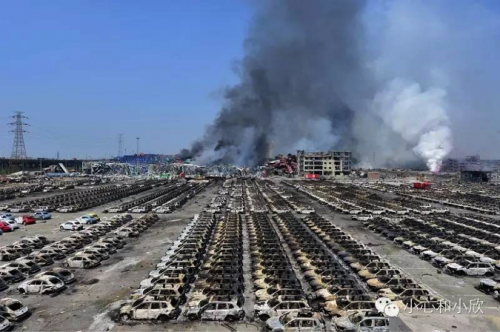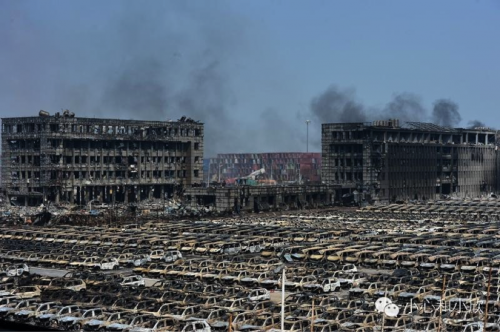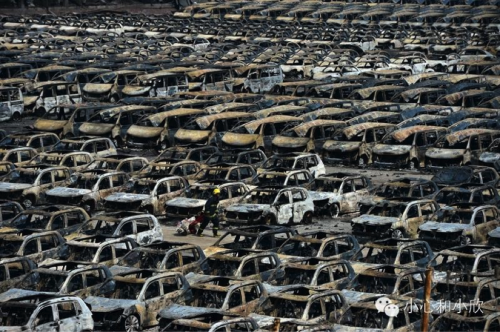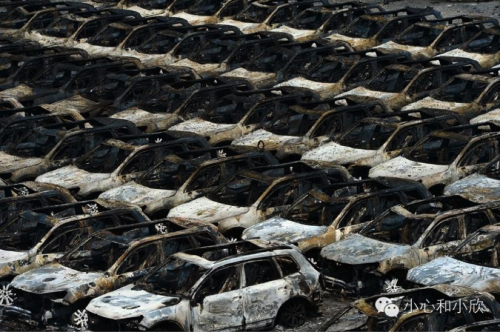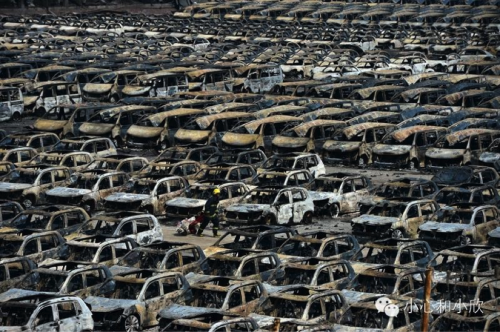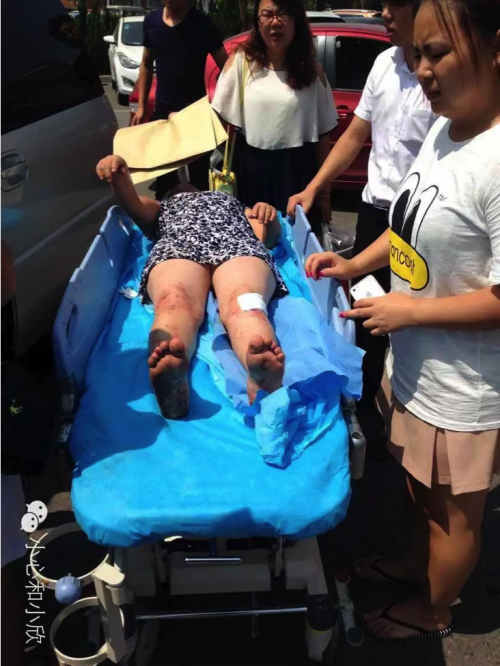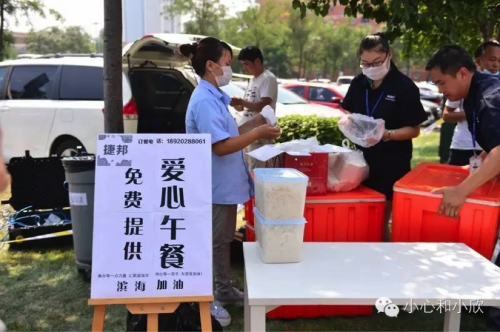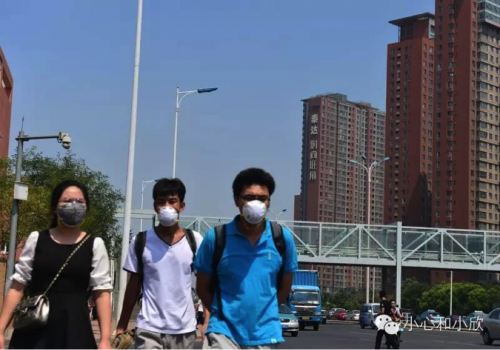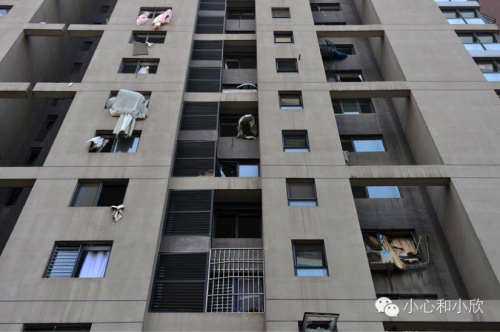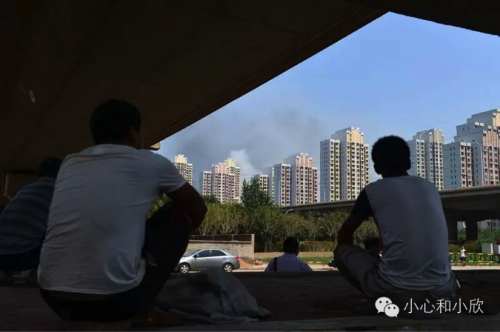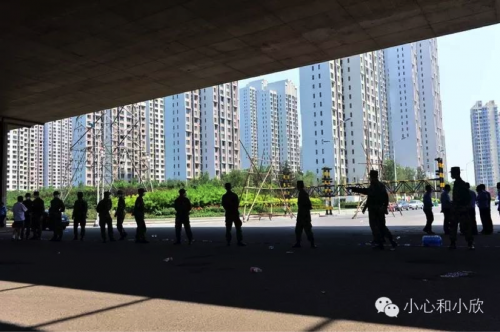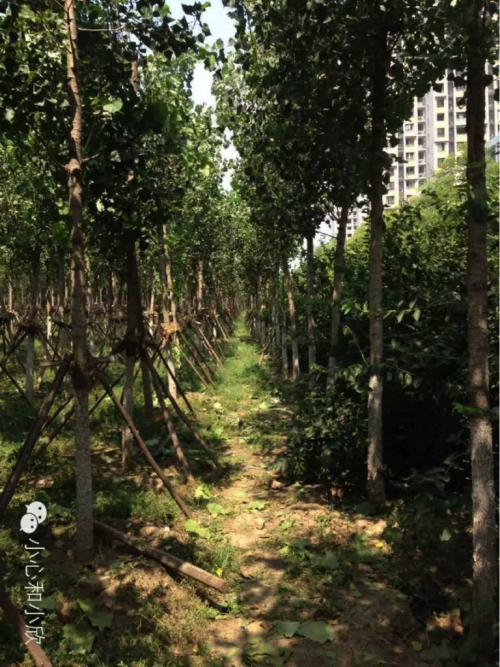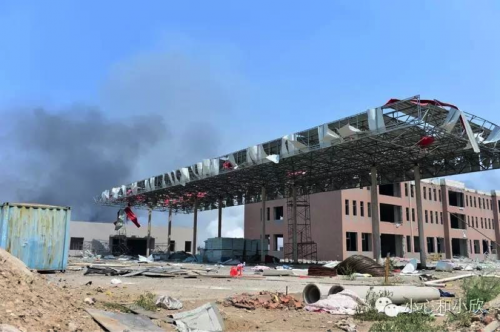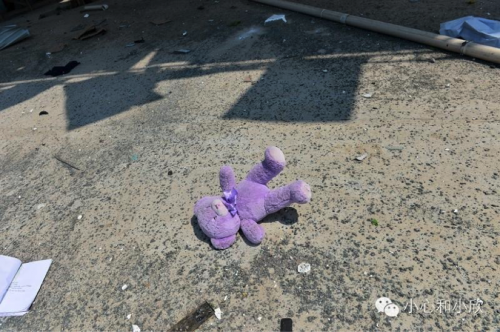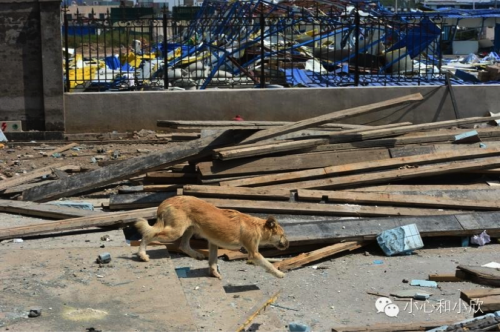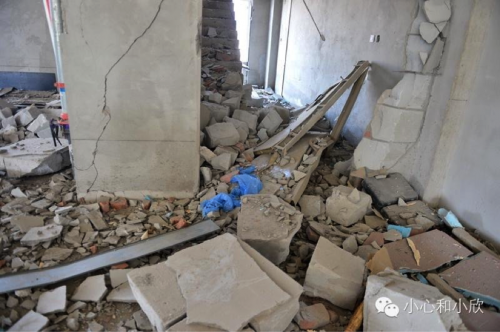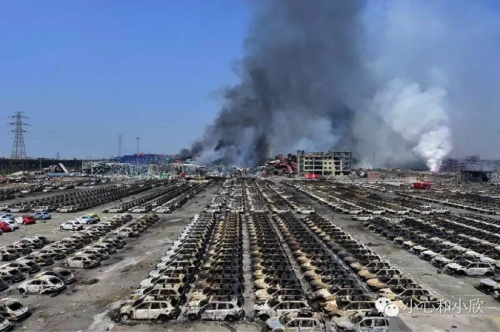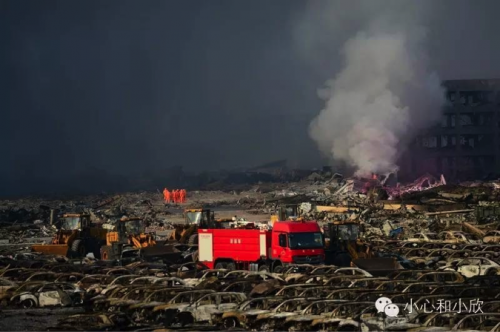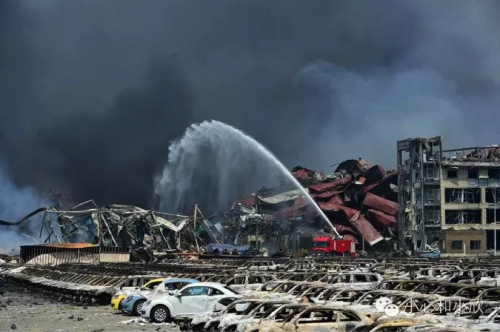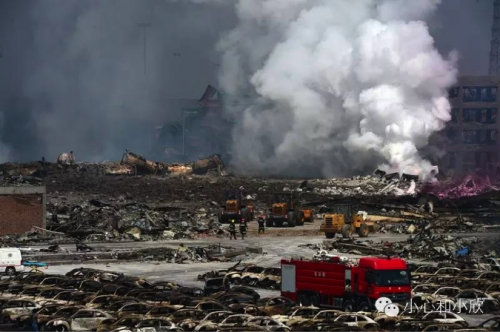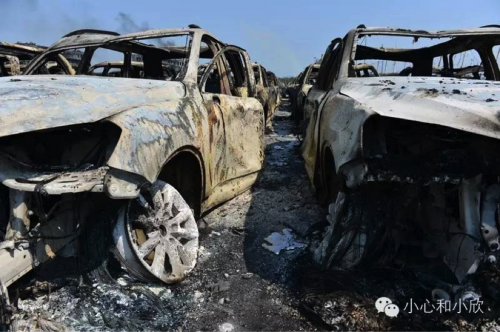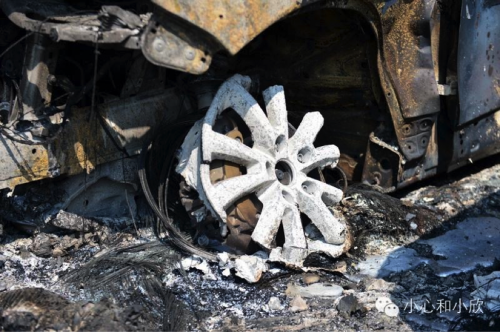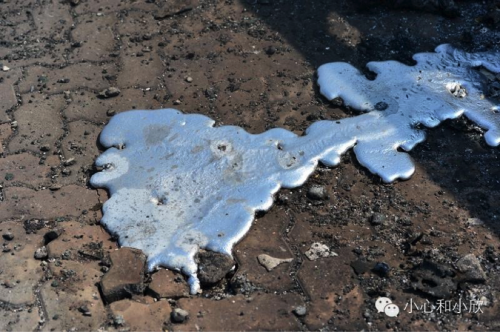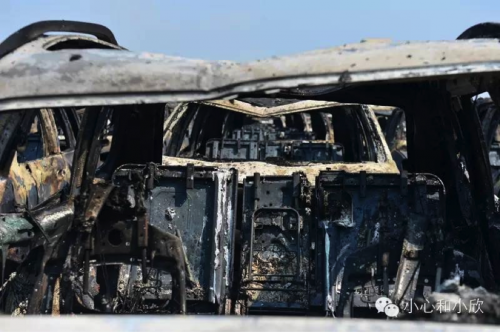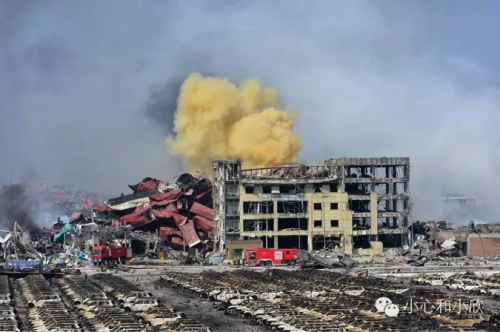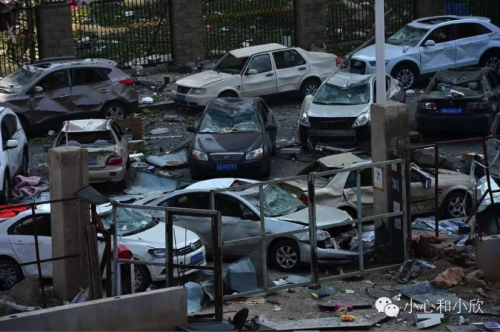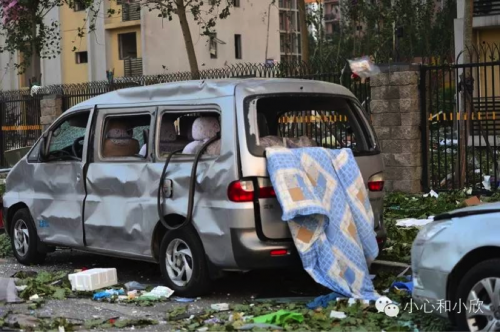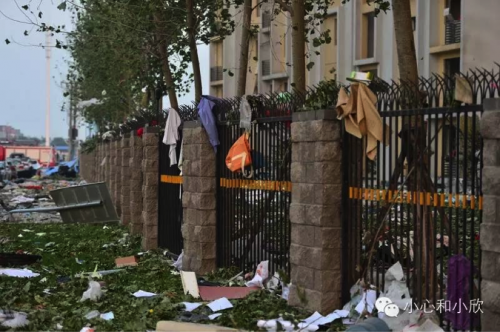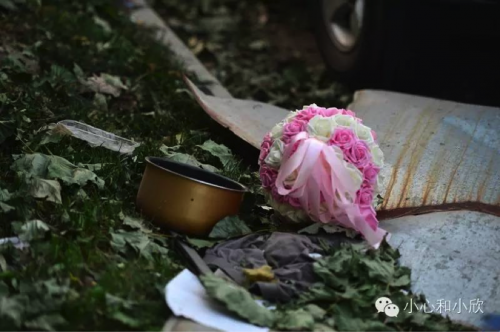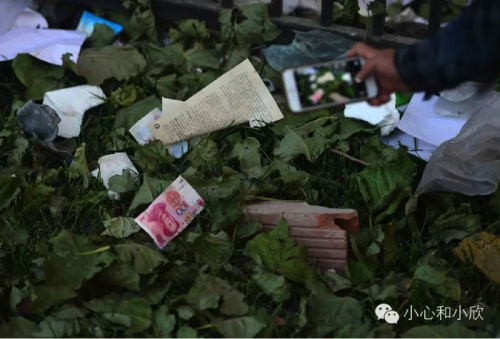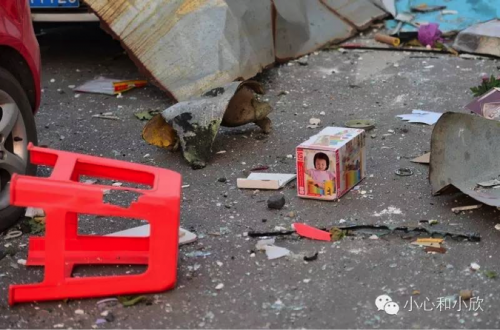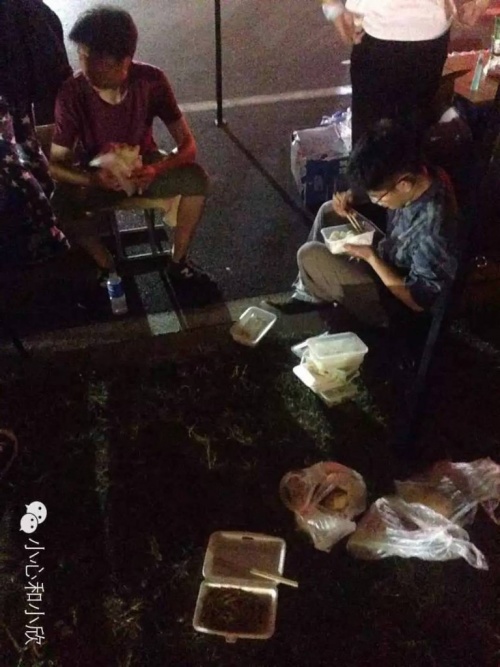How Far Can I Go? And How Much Can I Do?
来自China Digital Space
Journalist He Xiaoxin (和小欣) of The Beijing Daily (北京日报) traveled to report from the scene of the massive explosion in a chemical warehouse at the Tianjin port, in which 112 people have been reported killed so far. Dramatic photos and videos of the explosion traveled quickly around the world via the Internet. But in this photo essay, He provides an up-close, personal look at the devastation. Propaganda officials have since banned media from reporting on the explosion or posting stories that did not originate from Xinhua:
The site of this explosion is just like a scene from a movie.
Laying in my hotel bed, looking at my photos, this is what I thought.
1.
When I first set eyes on it, it startled me. This, this must be a movie!
A Hollywood sci-fi wouldn’t be this shocking.
This is like hell on earth. I could only think of one word—Chernobyl!
In that movie I like, “Constantine,” when Keanu Reeves enters Hell, flames roasting everything, that’s what this is like. These cars gutted by fire are like demons that have crawled out of Hell.
Just then a firefighter whizzes past my lens carrying a water bag.
He’s submerged in this sea of hell-cars, and last night this was a sea of fire!
How insignificant is a person before these manmade objects, how weak before the forces of nature!
Some people say firefighters are “mighty.” But as I see it, they’re just fragile bodies.
I know why I have come here!
This is a test.
2.
I’ll start at the beginning—
Late on August 12, before I fell asleep, I saw the news of the explosions in Tanggu. There was a little video. I even reposted it to my WeChat Moments. But I didn’t realize the gravity of the explosions.
Only when I woke up the next morning did I discover that my Moments had been wiped clean.
It was already late. I wondered if I should go. Our paper doesn’t often cover breaking news, and this didn’t even happen in Beijing.
But it’s so close. If I didn’t go? I’d regret it.
I volunteered and got permission. Off I went.
I bought a ticket for the high-speed train to Tianjin while in the cab to the South Railway Station. I wanted to go directly to Tanggu, but there weren’t any trains.
En route I stayed in contact with Brother Hao, who was going to Tianjin separately. He bought his ticket before me.
At 9:30, I got on the train to Tianjin.
While I was sitting there I suddenly got a text from Brother Hao. He said there was a high-speed train to Binhai leaving at 10.
I searched it online, and there it was!
I hesitated. Should I go to Tianjin first, or switch and go directly to Binhai?
Chao, who lives with her family in Tianjin and works in Binhai, was keeping in contact. Neither Brother Hao nor Chao could guarantee there wouldn’t be traffic on the way to Binhai, and the light rail was already closed. A cab, then? It’s over 50 km away…
At 9:36, the train stopped for two minutes. I jumped off and bought a ticket to Binhai.
At 10:10, I got back on the train.
It arrived on time to Binhai at 11:10.
I left the station and got a cab to TEDA Hospital.
3.
The closer I got to the scene, the more excited I became.
I missed the main scene of the accident, and could only get to the hospital, the secondary scene.
But early on I decided that I couldn’t just stop there.
At 11:35 I arrived at TEDA. This is what I saw at first:
Then I saw this:
The injured filled every sickbed. Volunteers and charity workers covered every inch of outdoor space.
Along with the volunteers/charity workers were layer upon layer of security and management. I went around the hospital twice, but found it kind of hard to take pictures of the seriously wounded and their treatment. So I decided then and there to move on.
When I left home I didn’t take a face mask. Even though I’d heard there was poison in the air, I felt it couldn’t be that bad, since people hadn’t dispersed from Binhai. And Chao said people had gone to work in Binhai as usual.
When I got there, I found the air quality wasn’t so bad, except for the smog.
Less than half of the people on the street were wearing face masks. As I rushed to the scene of the fire, I saw a lot of this.
I silently told myself, “Don’t psyche yourself out! It’s not that bad!”
4.
I’m not familiar at all with the area around the fire, so I chose to go on foot. That way I could get used to my surroundings and take photos as I went along.
About a kilometer from the scene of the fire I reached a residential area. Almost every piece of glass had been shattered. Curtains tossed in the breeze.
The locals seemed like they were watching a movie…
Dalu, a Beijing News photographer who had gotten to the main scene early in the morning, got in touch. He said they were already strictly guarding the perimeter, and he expected it would be tough to break through.
I walked for nearly half an hour and got to the police line.
I contacted Dalu again. He said the armed police had already pushed him out, and he wouldn’t go back.
That is to say, in a while I would be the only reporter inside…
I couldn’t get in from a guarded area, so I followed the overpass in (on the left). Underneath was a construction site parking lot. Everyone had already evacuated the area, so there was no one watching over it.
I continued on towards the scene of the fire. I walked three or four hundred meters when suddenly a security officer yelled at me from the road off the overpass, “Get out of here! What are you doing? This is the second time!”
I think he mistook me for somebody else. I didn’t protest. I turned around and went back until the parked trucks gave me cover. Then I turned back around and went into the space by the police line, just by the parking lot.
There was a meter-high railing, and beyond that a service road several meters wide. On the other side of the road was a shelterbelt, summer-lush and green.
If I went into the grove, there would be no way anyone could see me.
So I climbed over the railing and dashed across the road into the shelterbelt.
They were all small trees, ten-some rows of them. On the other side of the grove was a residential area.
I made my way through the trees towards the site of the fire.
Suddenly human shadows were swaying from the road in the residential area outside the grove. I immediately crouched and stopped walking.
They were armed police, five or six of them. They went back and forth along the road for several minutes. I didn’t even dare take a deep breath.
Finally they went back to the main road. I got back up and continued on my way. At last, I saw the area right by the epicenter—
5.
As I passed a low wall and ruins shaken apart by the blasts, I saw this building that had been utterly destroyed. On the far end was a three-story building. Smoke billowed beyond it.
teddy bear was lying on the ground. I don’t know where it had been shaken from.
Shattered glass lay inside and outside the three-story building. As I approached, a yellow dog suddenly sprung up and scurried away in a panic.
Besides the firefighters, it was only me and the dog.
I entered the first floor and saw that some of the wall had been shaken apart. I thought about going up to the second and third floors, but it would be too dangerous.
But I needed to find a high point, so I looked for other staircases.
I finally found a fairly intact staircase in a house on the far end. I stepped over the ruined doorframe and cement bricks, and climbed up to the third floor. I had a clear view of what I wanted right before my eyes—
Then I waited for movement out there. At this time I realized that the building I was hiding myself in was the closest to the scene of the fire.
Before he left, Dalu told me the firefighters had already left, and the site was totally empty.
But I discovered several firefighters still moving around there.
They were trying to put out the fire. But moments after they sprayed the foam, the sound of an explosion came out of the rubble. They had to stop again. After a few minutes they tried again. There was another little explosion.
The firefighters couldn’t put out the fire. There were only a few people left, and most of them waiting for orders.
The fire raged on.
6.
It was quiet for a few hours. I got all kinds of crazy news: that the hazmat team was on its way, that there was a leak of poison gas… But I didn’t move, because the firefighters below hadn’t left, and they weren’t wearing face masks.
But I’d waited too long, and I’d taken all the photos I could from on top of the building. It was approaching 3 p.m., when I would upload my photos to the official WeChat account. I couldn’t take it. I had to get down there and take photos.
As I got closer, I finally saw clearly the extent of the previous night’s disaster. Every single car had been burnt down to the frame.
Metal hubcaps were now dust.
The ground was burning hot, the heat emanating through the soles of my shoes and scorching my feet. Liquid metal lay on the ground in all kinds of shapes, a lot of it. It reminded me of the liquid robot in “The Terminator.”
It was even harder to look inside the cars.
The abandoned cars surrounded me. They were the closest to the scene of the fire, not twenty meters away.
I don’t know where my courage came from.
All around me were thousands of burnt-out cars. The ground was boiling beneath my feet. And here I was, standing in Hell.
7.
Right after I finished shooting the scene nearest the fire, I went back to my hiding place in the little building.
As I got ready to upload, I heard a muffled sound. Another explosion! At 2:44, a lump of yellow smoke.
All I’d seen before was black smoke and white smoke, with a few colors like blue thrown in. This cloud surprised me. It was too bright.
Just then I heard a firefighter outside the site yell, “Get out of there! It’s another explosion!”
At first the firefighters didn’t react, so the man on the outside kept yelling. Then he turned on a siren, piercing the space. Finally the firefighters ran out wildly.
As soon as I saw something wasn’t right, I packed up my gear, flew down the stairs, and went back to the grove of little trees.
Under the shade of the trees, I posted to WeChat while keeping my ears open to the situation. I wondered if I shouldn’t retreat a bit further. But everything had become peaceful again. Blue sky showed through the chinks in the treetops. That yellow cloud seemed to have dispersed quickly, without any after effects.
I finished uploading my post at 4:10. I got ready to go back to the scene.
After those firefighters ran off, they didn’t come back.
Now it was truly quiet.
8.
It seemed I was the only one there waiting.
But I didn’t want to leave, because I’d gotten word that the hazmat team was on its way. I’d also heard that there were still two storage tanks of hazardous chemicals at risk of detonation, and that they were getting ready to set them off manually.
Our newspaper isn’t like other media outlets. I was the only reporter on site. It was crucial that I stayed.
A colleague had also sent out a contact person who previously had been in charge of hazmat assignments at the Beijing garrison command. He hadn’t gotten to Binhai yet. Then he got there, but said the scene of the accident was too dangerous and that he himself wouldn’t go in. He asked me to “think of another way in.” I didn’t tell him I was already there.
During my long wait, several friends arrived at Binhai one after the other and had quickly gotten close to the scene: Feng Xiaohao, Brother Hao, and Teacher Yang.
I told my friends that they could sneak in. Brother Hao was the first to get to the perimeter, but unfortunately he wasn’t able to avoid the armed police. He was “pushed away by two people” and his camera was confiscated. His attempt to get in failed.
Xiaohao and Teacher Yang took a lot of pictures from the perimeter, and Xiaohao uploaded some from his phone. They circled again and again, finally crossing a brook and arriving at my hiding spot.
Teacher Yang and Xiaohao arrived at 5:50.
Teacher Yang had brought me a bottle of water. This was the first thing I’d had to drink since I drank a bag of milk in the morning. It really felt like life-saving water.
After the milk I’d had a package of Oreos, but I didn’t eat anything for lunch inside the police cordon. I’d brought some crackers, but without water they were too dry to eat. I’d fasted for nine hours at the scorching site of the fire. My throat was parched, and my stomach was so empty it made my heart flutter.
9.
I don’t know through what virtue or ability I’ve made you pay attention.
As for going to the scene of the accident, I didn’t really have any misgivings about it. And I didn’t feel like I was in great danger. But my friends had a different reaction.
Chao gave me a call at noon, around when I got to the scene. We’d been in constant contact before then. She’d told me everything she knew. As soon as she heard I had snuck in, she hung up.
Then my friend Xiaozhu sent a WeChat message, saying that Chao had called him in tears. She said it was too dangerous for me, but that she knew “telling him to leave is useless.”
Xiaobai sent me a WeChat in the afternoon. “You’re insane,” she cursed. “Why did you have to run so close to the site?” She wanted me to leave right then. I lied and told her I had already left. She asked me to WeChat her my location… She messaged me all afternoon to get me to leave. “I admire brave reporters,” she said, “but I don’t want you to be one!”
Countless people WeChatted me, telling me to be safe, sending me every piece of news they had. I got some of the same “danger messages” multiple times. Friends also sent me messages of support. In the evening my buddy Cao Zheng arranged a free hotel room for me through his business, but I’d already found a place to stay. I’m unworthy of my friends’ kindness.
Thanks, everyone.
10.
Around 6 p.m. a small group in yellow hazmat suits went onto the site. There wasn’t any new activity after that. Friends outside kept warning me that they might be setting off explosions towards nightfall, but I didn’t see a hint of that, and no one had left.
By 6:30 I couldn’t wait any longer. The messages about impending detonations were getting more urgent. Xiaohao and Teacher Yang had gone to photograph the ruined homes on the other side.
I soon followed after them.
The Wanke Harbor City development was just a few hundred meters from the blast site. Now it was a pile of rubble. Not a single window was intact. Household items were scattered everywhere.
I don’t know what kind of quake happened there last night. Stuff had been thrown towards the site of the explosion. But shouldn’t the shock wave have sent stuff in the opposite direction?
I still don’t get it.
The cars below the building had all been warped, their windows shattered.
A quilt was blown out of this car, left hanging out the back.
Clothes, odds and ends:
Kitchen utensils and a wedding bouquet.
Beautiful dreams and everyday lives, they’d all been shaken apart.
Money, money everywhere.
We can’t take it.
A children’s toy:
There were so many other things. Feng Xiaohao even found lingerie…
In an instant, they were all thrown out of the normal realm.
Each person’s life is like a clay pot. It holds so many things. But it’s fragile. One shock can break it apart.
The money we work so hard for, the houses and the cars we buy, all destroyed in an instant.
We spend countless years hoarding everyday objects, and in a flash they’re gone.
Even life itself—don’t think about that.
But as long as we’re still alive, who cares about losing all those other things?
As I looked at all this, I finally understood what is meant by “just things.”
Except for life, everything else is empty.
11.
After just a few minutes of taking photos, the police found all three of us.
They took our ID cards. They searched and interrogated us.
We’d seen a lot of reports about police and residents preventing journalists from taking photos, so we didn’t say we were journalists. We said we were students who had just come out of curiosity.
I thought our ruse was pretty week. No one would believe it. Our backpacks were filled with cameras and computers.
My ID card is from when I was at the Communication University of China, and it has the school address on it.
But the police didn’t show any signs of seeing through our lie. I don’t know if they really believed us, but in the end they didn’t figure us out, and they didn’t see our press cards. Instead, their voices relaxed as they explained that they had searched us in order to protect the residents’ property. They were responsible to the people of Tianjin, and they were responsible to us.
When they searched us, they wanted me to open my backpack and turn out my pockets. I told them to search me themselves, but they didn’t dare. I’d taken the memory card out of my camera and put it in my pants pocket. An officer said it wasn’t hidden on me. He patted me down haphazardly, but didn’t find the card. Then they made me delete every photo from my cell phone, one by one. Then they made me open my laptop. It was in sleep mode, and as soon as I opened it photos from the scene popped up. I couldn’t escape. I deleted every photo. They even found another folder of photos.
I really don’t think our “student ruse” fooled anyone, but the police are complicated. They didn’t completely fulfill their duties. On the outside they’re strict, but they provided me with so many loopholes.
Only after I’d left did I discover that I was the most carefully search among the three of us. They’d even deleted the photos on my cell phone and computer.
After they had searched me, before I left, an officer yelled at me, “Take off your shoes!” He thought I was hiding something in them. How naive. He even made me take out the insoles. Of course he came up with nothing.
We left.
12.
I spent the entire afternoon hiding at the site. I didn’t take any more photos outside the hospital, and I never got any pictures of the firefighters or the hazmat team. I still have a lot of regrets.
We walked a few hundred meters after we left and hailed a cab. A female driver wearing a face mask pulled up and asked if we were family. We told her we were from the media.
When we got out, she wouldn’t take our money. “You’ve done so much,” she said. We still paid her in the end.
At 8 p.m. we got box dinners from the volunteers outside the hospital and ate on the lawn. We just had to fill our bellies.
We talked as we ate. One of the reporters suddenly said, “Chaogetu killed himself.”
Chaogetu used to be an investigative reporter for Beijing News. Now the investigative reporting department is gone.
At first I had no reaction. When I heard Chaogetu I said, “I’ve been to his house and slept in his bed.”
Yes, it must have been three years ago. I went with friends from Beijing News to the house they rented with him. He was on a business trip, so I slept in his bed that night.
He had a big bookshelf and a big white cat. The cat was very docile. In the night it came to sleep with me on that soft twin bed.
I’ve always wanted to have a cat like that…
Now that its owner is gone, what will happen to the cat?
Chaogetu suffered from depression. He jumped out the window. He didn’t give anyone a chance to save him.
I’d seen a day’s worth of Hell, and now I heard this news. I felt a little hope had left this world.
A person I shared only a tenuous connection with—a person I’d heard of and admired, a person who’d slept on the same bed with the same cat as me, but a person I had never met—was gone. I felt strange.
I thought, “This is just the way things go.”
13.
It was the wee hours again. Before I fell asleep, I checked my WeChat moments and saw a friend’s message:
“It’s midnight. Let’s erase the old day!”
But I can’t erase it.
I saw that a colleague at Beijing News had written song lyrics in honor of Chaogetu:
You ask if I can stop my sadness, You tell me to put out the fire in my heart. What can I tell you When everything I say is wrong?
This day, this strange day, this day filled to the brim. It’s over.
Xiaobai says to me, “You always ask for trouble!” She tells me to go back to Beijing in the morning, and send her my locations in real time.
My online name is “Xiaoxin He Xiaoxin” (小心和小欣). It means “Beware the person named He Xiaoxin,” but a lot of people think it’s two people’s names—Xiaoxin and Xiaoxin, one named “Be Careful” and another named “Little Joy.” And today, too many people have told “Little Joy” to “be careful!!!”
I admit it, I’m doing it, I have been a little careful. But what I’m wondering now, after hearing and seeing more of the kinds of things I saw today—
How much further can I go? And how much can I do?
by He Xiaoxin [Chinese]
Translation by Anne Henochowicz.
China Digital Space Related Links

